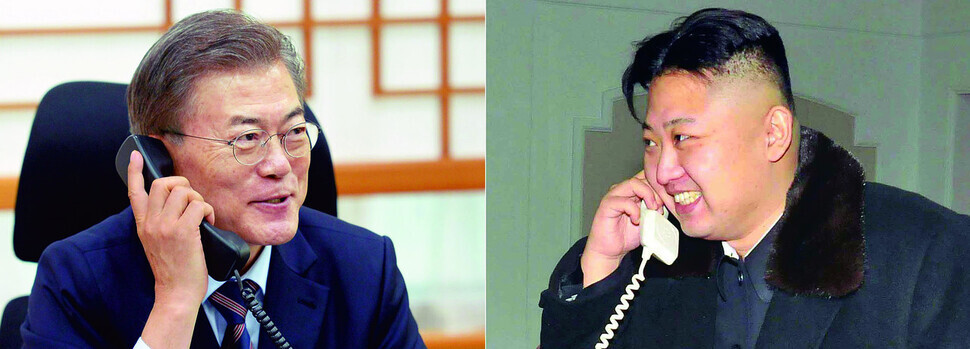hankyoreh
Links to other country sites 다른 나라 사이트 링크
[Editorial] Reopening direct hotline between South, North Korea should be stepping stone for normalizing inter-Korean relations

The hotlines used for inter-Korean communication were unexpectedly restored Tuesday, more than a year after they were shut down in June 2020.
This is a welcome development, sending a positive signal on the prospects for improving inter-Korean relations that have long been at an impasse. It’s even more significant that this agreement to restore the hotlines was based on direct communication between South Korean President Moon Jae-in and North Korean leader Kim Jong-un, who exchanged ongoing correspondence on the matter.
Hopefully, this will be an opportunity for the two sides to join forces once again to restore their own relationship and restart the Korean Peninsula peace process with improvements to North Korea-US relations.
South and North Korea announced the hotlines’ restoration simultaneously at 11 am Tuesday. Shortly afterward, the South Korean Ministry of Unification and Ministry of National Defense confirmed that follow-up measures had been implemented with the direct line at Panmunjom, the inter-Korean joint liaison office communication line, and the military hotline.
Beyond their technical role, hotlines have served as signals in the history of inter-Korean relations, announcing when those ties have been broken and mended.
In June 2020, North Korea unilaterally shut down the hotlines amid its harsh condemnation of the scattering of leaflets by certain defector groups operating in the South. In that sense, their reopening could be seen as a visible, symbolic step toward communication and restored trust between the two sides.
Explaining the background behind the agreement to restore the lines, a Blue House senior official said the two leaders had “shared some of the problems resulting from inter-Korean relations being disconnected for so long, and agreed on the need to restore relations and trust quickly for the sake of peace on the Korean Peninsula.”
This means that they agreed to restore the hotlines as a first step amid their exchanges of letters since April to discuss restoring inter-Korean relations in general.
Also noteworthy is that both sides predicted the restoration would play a positive role in the improvement and advancement of inter-Korean relations.
This means they have laid the groundwork for getting things moving once again. They can go about efforts now to truly improve relations in terms of exchange, cooperation, and humanitarian assistance areas such as COVID-19 prevention and other public health, food, and reunions among divided family members.
For more than two years since the collapse of the North Korea-US summit in Hanoi in February 2019, inter-Korean and North Korea-US relations have been unable to move forward. Under these circumstances, the South and North Korean leaders could be said to have signaled their commitment to opening up a path in their relationship and taking the initiative to promote peace on the peninsula.
The inclusion of a message indicating “support for inter-Korean dialogue, engagement, and cooperation” in the joint statement from the South Korea-US summit in Washington on May 21 may also be seen as reflecting these efforts.
Resolving issues in inter-Korean and North Korea-US relations will require efforts from all three parties. The US needs to send clearer signals to encourage the North to agree to dialogue.
Given how bad North Korea’s food situation has grown and how dire its COVID-19 prevention needs are, Washington might consider relaxing its sanctions in areas such as health, nutritional support for infants, and food assistance.
North Korea, for its part, needs to avoid the kinds of shows of military force that could make things worse while showing a proactive attitude toward improving relations with the South.
The South Korean government will need to focus its energies on keeping the political situation on a stable footing, holding close discussions with the US to adjust their plans for joint military exercises this August.
Please direct comments or questions to [english@hani.co.kr]

Editorial・opinion
![[Column] Season 2 of special prosecutor probe may be coming to Korea soon [Column] Season 2 of special prosecutor probe may be coming to Korea soon](https://flexible.img.hani.co.kr/flexible/normal/500/300/imgdb/original/2024/0426/3317141030699447.jpg) [Column] Season 2 of special prosecutor probe may be coming to Korea soon
[Column] Season 2 of special prosecutor probe may be coming to Korea soon![[Column] Park Geun-hye déjà vu in Yoon Suk-yeol [Column] Park Geun-hye déjà vu in Yoon Suk-yeol](https://flexible.img.hani.co.kr/flexible/normal/500/300/imgdb/original/2024/0424/651713945113788.jpg) [Column] Park Geun-hye déjà vu in Yoon Suk-yeol
[Column] Park Geun-hye déjà vu in Yoon Suk-yeol- [Editorial] New weight of N. Korea’s nuclear threats makes dialogue all the more urgent
- [Guest essay] The real reason Korea’s new right wants to dub Rhee a founding father
- [Column] ‘Choson’: Is it time we start referring to N. Korea in its own terms?
- [Editorial] Japan’s rewriting of history with Korea has gone too far
- [Column] The president’s questionable capacity for dialogue
- [Column] Are chaebol firms just pizza pies for families to divvy up as they please?
- [Column] Has Korea, too, crossed the Rubicon on China?
- [Correspondent’s column] In Japan’s alliance with US, echoes of its past alliances with UK
Most viewed articles
- 1‘We must say no’: Seoul defense chief on Korean, USFK involvement in hypothetical Taiwan crisis
- 2[Column] Season 2 of special prosecutor probe may be coming to Korea soon
- 3N. Korean delegation’s trip to Iran shows how Pyongyang is leveraging ties with Moscow
- 4Amnesty notes ‘erosion’ of freedom of expression in Korea in annual human rights report
- 5Korea sees more deaths than births for 52nd consecutive month in February
- 6[Reportage] On US campuses, student risk arrest as they call for divestment from Israel
- 7[Editorial] New weight of N. Korea’s nuclear threats makes dialogue all the more urgent
- 8‘Weddingflation’ breaks the bank for Korean couples-to-be
- 9Division commander ordered troops to enter raging flood waters before Marine died, survivor says
- 10[Editorial] Korea’s surprise Q1 growth requires objective assessment, not blind fanfare